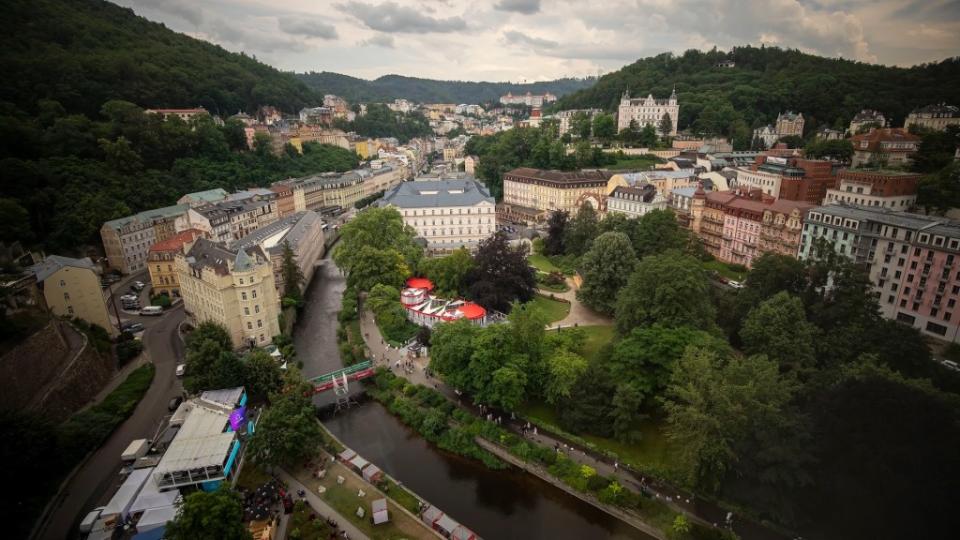How the Karlovy Vary Film Festival Created a Haven for Cinema in a World of Trouble
Hidden within a valley range west of Prague in the northwest Czech Republic, the spa town of Karlovy Vary was offering a kind of haven and retreat centuries before the film festival — or really, the very art form of cinema — came into being. But that sense of distance and isolation made a different echo over the course of this year’s 58th edition of the Karlovy Vary International Film Festival, which wrapped on July 6.
Over the course of nine days and more than 200 screenings, the 2024 festival took place during a time of sustained international tumult, including era-defining elections in the U.K. and France set against a new sense of urgency in the U.S. presidential race and ongoing, strike- and business-related uncertainties closer to showbiz. With the planet ablaze, what else could one do but buckle down and focus on cinema?
“It felt like stolen time,” says producer Christine Vachon, who holds both French and American nationalities, and who made sure to vote in the French elections before following the U.S. equivalent while serving on this year’s jury. “We had this privilege of stealing this time away from what was happening [across the globe], and instead being able to ask, ‘Wait, you really liked that Portuguese movie?’”
In the end, Vachon and her four co-jurors — among them Geoffrey Rush — singled out Mark Cousins’ “A Sudden Glimpse to Deeper Things” for the top prize, awarding a documentary about an artist’s moral and ecological awakening and a film that argued for greater engagement with the surrounding world.
Above all, the Czech festival has looked to foster that sense of engagement. KVIFF makes all of its screenings easily accessible to the young crowds that flock to the spa town to camp out in the woods and binge as many titles as they can, all while seated alongside international filmmakers and awards voters who attend for the very same reasons.
Indeed, with a selection split between world premieres and previous festival breakouts — and with an intimate environment that encourages attendees from all walks to mingle — Karlovy Vary could be described as a Bohemian cousin to Telluride.

“We try to build a special bond,” says artistic director Karel Och. “Filmmakers and attendees feel that we’re all around them, that we’re part of them and that they are part of us. We don’t want to become this impersonal machine; we try to be as personal as possible when connecting the filmmakers with the public, and that keeps the experience dynamic.”
Such dynamism can be crucial for festival-selected titles. Last year, for example, Stephan Komandarev’s “Blaga’s Lessons” surged out of Karlovy Vary with three prizes — including the festival’s top honor, the Crystal Globe — before securing the slot as Bulgaria’s selection for the Oscars’ Best International Feature Film race. And once the prizewinning film screened stateside for the Academy, the festival team followed in tow.
“We’re admirers, we’re fans, we’re friends of our filmmakers,” adds Och. “That’s why we always keep in touch, looking to accompany the films both at the festival and well after. We want to accompany these works as far as possible, because we try to build that special link, to remain connected all the way through.”
From the 2024 recent crop, the Norwegian domestic drama “Loveable” will likely carry the Karlovy banner far and wide. Produced by the same team that made the Oscar-nominated “The Worst Person in the World,” this latest film also tracks an adult coming-of-age narrative. But it looks even later in life to follow a forty-something mother of four confronted with uneasy existential questions as her relationship falls apart.
“Loveable” presents an unflinching take on the material, burrowing ever-so deep into the main character’s psychology and into the acute communication breakdowns of a loving but nonetheless troubled marriage to make for an appealingly uncomfortable watch. Director Lilja Ingolfsdottir mined her own marital history — in many ways inviting comparisons to “Marriage Story” and “Anatomy of a Fall” — all while casting her own intimate experience with such universal terms that nearly each and every festivalgoer saw elements of their own life reflected back onscreen.
“Writing the script took my whole life and just a few months,” Ingolfsdottir tells TheWrap. “I always try to explore, digest, investigate and then dramatize material from my own life, and that really seemed to resonate. After each screening, [the team and I] ended up giving relationship advice, acting as psychological advisors once people came to us sharing their own stories.”
Like “Blaga’s Lessons,” “Loveable” left Karlovy Vary with several prizes in tow, claiming the jury award alongside best actress honors for star Helga Guren, as well as three accolades from parallel juries. Given the film’s domestic release just beyond the submission deadline, “Loveable” will probably not figure into this year’s international Oscar race — already a competitive one given the respective success of Norwegian films “Sex” and “Armand” in Berlin and Cannes — but that should hardly dim the film’s bright future.
Guren has taken a two-year sabbatical from her theatrical troupe in order to better accompany her star-making role, while the film has already received invitations from other preeminent international festivals. And wherever “Loveable” goes, the Karlovy Vary team hopes to follow, banging the drum for their selection and for their greater festival — touting a haven for film open to the wider world.
The post How the Karlovy Vary Film Festival Created a Haven for Cinema in a World of Trouble appeared first on TheWrap.


